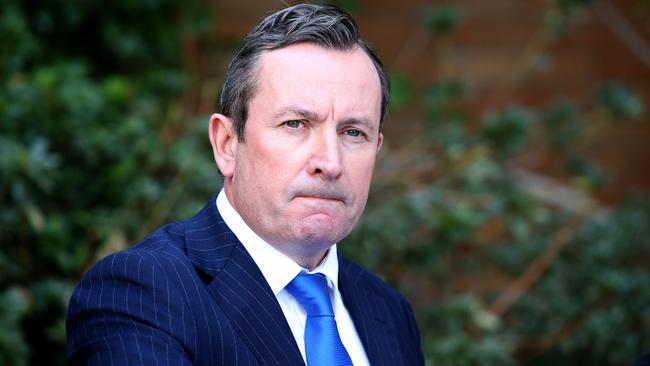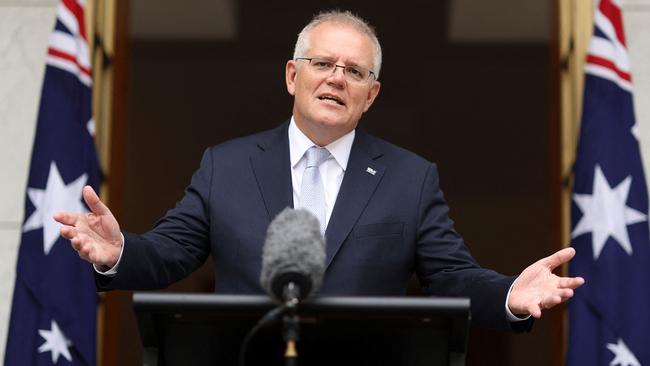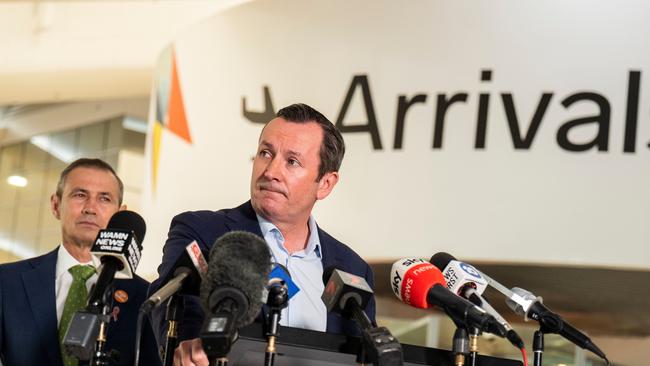Seats in the wild west to determine federal election
There is a chance Mark McGowan won’t even let Scott Morrison into WA to campaign, such is his loathing of the PM. He didn’t even bother to dial in to this week’s national cabinet meeting.

The conservatives hold the lion’s share of seats in Queensland, for example. If there is a move against the government there the election will be over soon after counting begins.
Tasmania is vulnerable for the opposition according to Labor insiders, but there are very few seats south of Victoria.
Melbourne has been one of the most locked-down cities in the world, so pandemic management will be hotly debated on the campaign trail.
And if you’re a Coalition strategist hoping to pick up seats to offset losses elsewhere, the NSW Hunter Region has three seats potentially on offer. Why do you think Anthony Albanese has promised high-speed rail between Newcastle and Sydney?
So yes, there are interesting contests right around the nation. But WA and western Sydney are the places to watch most closely. While there are seats the Coalition can win in the Hunter to offset losses elsewhere, that’s also the case in western Sydney. Macquarie is the most marginal Labor-held seat across the country and, with the local Labor MP in Parramatta retiring, Liberals will fancy their chances there too. Equally, retaining the western Sydney seat of Lindsay will be tough for the government, especially if pandemic management woes persist. It’s a bit of a bellwether electorate.
The possibility of what happens further west, across the Nullarbor in WA, could see Australians having to anxiously wait for hours until booths close and west coast counting begins.

There isn’t much of a tradition of federal elections reflecting state results in WA. But these are unusual times, and the WA pandemic experience has been very different to elsewhere, especially along the east coast. Scott Morrison is sometimes sarcastically referred to as the PM for NSW, his home state. That line of attack resonates in the highly parochial west. And when you consider just how popular Premier Mark McGowan is locally – ironically he was born and raised in NSW – the adopted West Aussie’s loathing of Morrison could count for something on polling day.
There were 16 seats in the west up for grabs in 2019, Liberals winning 11 of them. But in the redistribution since the last election one seat was abolished – Liberal-held Stirling. It was replaced with a notionally Labor seat in Victoria. So Liberals are defending 10 of 15 seats in WA. Yet at the state election last year they won only two of 59 seats in the Legislative Assembly. A record worst performance. In other words, plenty of West Australians who voted Liberal federally in 2019 voted for McGowan’s Labor Party last year. Will they think about voting Labor again this year?
McGowan will campaign strongly for Anthony Albanese. To be sure, they aren’t especially close. But as Captain James T. Kirk from Star Trek once said: “The enemy of my enemy is my friend.” The origins of that phrase run deeper than Hollywood science fiction, of course. It can be traced right back to a 4th-century South Asian treatise on statecraft, which translated reads as: “My friend, the enemy of my enemy.”
Premiers and prime ministers of different political complexions often get along, even benefiting from party political opponents at different tiers of government doing well. Geoff Gallop, for example, didn’t mind when John Howard vanquished Mark Latham in 2004 a year out from his own re-election campaign.

But McGowan will want to see Morrison suffer at this year’s election, including for his own political self-interest. If the Liberals lose federal seats off the back of having won just two lower house seats at the 2021 state election, the party will be brought to its knees. That will make McGowan’s third-term re-election even more certain than it already is.
Besides, the barbs flying between the WA Premier and Prime Minister have been more hostile than usual during this pandemic. For a time there, the prospect of a federal government challenging the WA government’s right to control its borders in the High Court was on the cards. There is a chance McGowan won’t even let Morrison into WA to campaign, depending on what happens next during this pandemic. He didn’t even bother to dial in to this week’s national cabinet meeting.
When you survey the 10 seats the Liberals currently hold in the west, as many as half of them are winnable for Labor: Swan, Pearce, Hasluck, Tangney and even Canning. What makes this risk most fascinating is that WA often doesn’t follow the national trend.
For example, in 1996 when Howard was winning seats around the country on the way to defeating Paul Keating’s Labor government, the Coalition lost seats in WA. In 2007, when Howard was shown the door, even losing his own seat, Liberals picked up a seat in WA. It is entirely possible Morrison recovers ground between now and election day along the east coast, but has to nervously wait for the WA results before knowing for certain if he’s retained his majority.
The two WA seats most at risk for the Liberals are Pearce and Swan. The former was held by former attorney-general Christian Porter, who is retiring. Ordinarily a 5.2 per cent margin would be considered relatively comfortable, but not after the controversies engulfing Porter. Steve Irons is retiring as the local MP for Swan, and it is the government’s most marginal WA seat at 3.2 per cent. Hasluck is the third-most marginal government seat in the west, on 5.9 per cent. Ken Wyatt is a popular local MP but, at 69 years of age, speculation abounds that he yet might pull the pin on running. His personal following would be sizeable.
Tangney (9.5 per cent) and Canning (11.6 per cent) are notionally safe seats for the Liberals. But Labor strategists are surprisingly hopeful in Tangney, even though it is a traditional conservative seat. Their belief comes back to its boundaries overlapping with state seats now held by Labor. Canning is held by a double-digit margin, and Andrew Hastie is a potential future conservative prime ministerial candidate. But Canning has swung from one election to the next by double-digit margins before. It’s a volatile seat that is safe until it’s not.
Realistically, Pearce, Swan and Hasluck are the seats to watch most closely, but three WA seats on a knife edge is enough to leave east coast Australians glued to their television screens unsure which party has won until WA voters decide. And after last year’s state results, it would be a brave federal Liberal MP who sits back confident on election night that their margin in 2019 will hold up in 2022.
Peter van Onselen is political editor at the Ten Network and a professor of politics and public policy at the University of Western Australia and Griffith University.








Winning the west will be the key to winning this year’s federal election. That is, the western suburbs of Sydney and West Australian electorates. Yes, every seat is important at elections, and it is easy to find reasons to focus attention elsewhere.